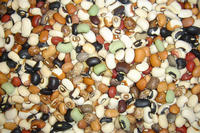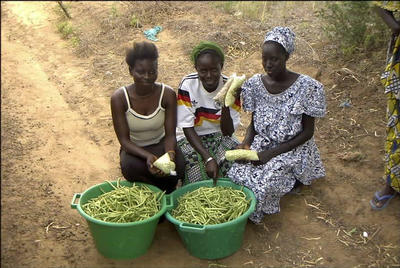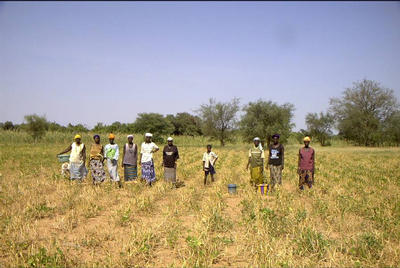Riverside, California
November 7, 2007
 |
|
Genetic diversity of cowpea seed. Photo credit: J.
Ehlers, UCR. |
Providing food security, one of
the greatest challenges of our time, is a critical goal
especially in the developing world, where crop destruction by
drought, disease and pest infestation swiftly places millions of
lives at risk of hunger.
Scientists at the University of
California, Riverside will help meet this challenge by
focusing on cowpea, a protein-rich legume crop of immense
importance to Africa that complements starchy staple crops such
as corn, cassava, sorghum and millets in the diets of millions
of Africans.
The research, which is expected to significantly benefit
resource-poor African farmers, is being made possible by a
three-year grant of nearly $1.7 million to UC Riverside from the
Generation Challenge Program of the Consultative Group of
International Agricultural Research (CGIAR).
The UCR researchers will apply genomic technology to develop new
and improved cowpea cultivars that have tolerance to drought as
well as improved resistance to pests and diseases. Due mostly to
drought and pests, cowpea yields in Africa oftentimes are less
than one fourth their potential yield.
“UCR hosts a collection of 5,000 cowpea varieties from around
the world,” said
Jeff Ehlers, the principal investigator of the grant and a
specialist in the Department of Botany and Plant Sciences with
more than 20 years of experience conducting genetic research on
cowpea in California and Africa. “These genetically diverse
varieties offer a treasure-trove of genes of potential value to
breeders seeking to build better cowpea varieties. Because of
the grant, we will be able to more efficiently identify genes we
can use to develop improved cowpea varieties.”
Cowpea is popular in the southern United States, where it is
known as ‘black-eyed peas’ and other names, and consumed as a
freshly shelled or dry bean. Immature pods of cowpea are used
throughout Asia as a ‘green bean,’ and go by the name ‘yardlong’
or ‘asparagus’ beans.
Produced on more than 30 million acres in hot, drought-prone
regions of the tropics and subtropics, cowpea not only provides
nutritious food for millions of people and their livestock, but
also generates income for rural producers, traders, and
small-scale urban food vendors, while at the same time enhancing
soil fertility.
| |
 |
|
Roadside vendors
of cowpea (shelled and whole pods), near Thies,
Senegal. Photo credit: J. Ehlers, UCR. |
|
“Cowpea yields are traditionally
low in Africa, a continent where diets don’t tend to be
meat-based,” said
Philip Roberts, a professor of nematology and a co-principal
investigator of the grant, who currently leads UCR’s Bean/Cowpea
Collaborative Research Support Program – a highly successful
project, supported by the U.S. Agency for International
Development, that has assisted African institutes in developing
more than five improved cowpea varieties over the past decade.
“The research this new grant will enable has potential to
convert cowpea – the poor man’s meat in Africa – into a better
cash crop for income generation, thereby increasing living
standards.”
UCR researchers have been providing assistance to African
scientists since the early 1980s in their work to develop
improved cowpea varieties for poor farmers in Africa.
Because it has been largely neglected by the research community,
cowpea is called an “orphan crop.” Despite its importance to a
significant number of the resource-poor, it has lagged behind
other grain legume crops in the development of basic genomic
resources and tools needed to implement modern breeding
approaches that could alleviate major constraints facing cowpea
producers.
“Our project will develop the key genomic resources that are
currently lacking in cowpea,” said
Timothy Close, a professor of genetics and a co-principal
investigator of the grant, who leads UCR’s cowpea genomics
effort. “We will use modern plant breeding approaches that
employ new and efficient molecular marker development
methodologies.”
Molecular markers are landmarks that help plant scientists
identify specific chromosome segments that contain genes of
interest. Marker-assisted selection technology allows breeders
to more precisely and simultaneously select the best trait
combinations (or genes) during the breeding process.
“For example, a plant scientist might mark a combination of
genes known to increase disease resistance,” Close explained.
“Breeders wanting the disease resistance trait then use marker
information to identify individuals containing that specific
combination of genes. They do so without having to directly
measure the trait, which can be difficult and expensive.”
Ehlers, Roberts and Close, along with their project-funded
programmers, postdoctoral researchers and students, will develop
a detailed genetic ‘roadmap’ of cowpea. In collaboration with
their African partners in the national breeding programs of
Senegal, Burkina Faso, Cameroon as well as with the
International Institute of Tropical Agriculture in Nigeria, they
will identify genes linked to important traits such as tolerance
to drought and resistance to pests.
The grant to UCR is part of a broader effort by
CGIAR’s
Generation
Challenge Program to improve legumes in sub-Saharan Africa,
including beans, groundnuts and chickpeas.
The Generation Challenge Program is a research network that uses
plant genetic diversity, advanced genomic science and
comparative biology to develop tools and technologies that
enable plant breeders in the developing world to produce better
crop varieties for resource-poor farmers.
A brief history of UCR’s assistance to Africa through cowpea
research:
| |
 |
|
Farmers in Burkina
Faso harvesting improved cowpeas resulting from
a UCR project. Photo credit: J. Ehlers, UCR. |
|
In the late 1970s, Anthony Hall, a
professor emeritus of plant physiology, pioneered work on cowpea
at UCR. His research on cowpea physiology contributed to a
deeper understanding of cowpea’s adaptation to drought, heat and
poor soils. He also led the effort to establish the first
genetic map for cowpea.
The recipient of numerous national and international awards,
Hall helped develop and then run an internationally respected
long-term project involving scientists from UCR, Senegal and
Ghana.
The project trained 13 African scientists (10 doctorates; 3
master of science degrees) and released improved, early maturing
cowpea varieties in Senegal (3 varieties: Mouride in 1992,
Melakh in 1995, and Yacine in 2004), Ghana (Marfo-Tuya and
Aapagbaala, both in 2004) and Sudan (Ein-el-Ghazal in 2003).
These varieties have combinations of heat and drought tolerance
and improved pest resistance that enhance farmer productivity.
Since 2002, UCR has worked closely with cowpea breeding programs
in Burkina Faso, where new candidate varieties developed by UCR
are being tested ‘on-farm’; and in Cameroon, where UCR is
providing support, materials and guidance to re-establish a
discontinued breeding program.
The university also works with cowpea scientists from other
African countries through exchanges of cowpea germplasm (or seed
stocks) as well as the sharing of information and expertise.
In February 2003, UCR organized a week-long workshop on campus
for seven scientists from five West African countries on the use
of molecular markers in breeding.
The University of California,
Riverside is a doctoral research university, a living
laboratory for groundbreaking exploration of issues critical to
Inland Southern California, the state and communities around the
world. Reflecting California's diverse culture, UCR's enrollment
of about 17,000 is projected to grow to 21,000 students by 2010.
The campus is planning a medical school and already has reached
the heart of the Coachella Valley by way of the UCR Palm Desert
Graduate Center. With an annual statewide economic impact of
nearly $1 billion, UCR is actively shaping the region's future.
|
|